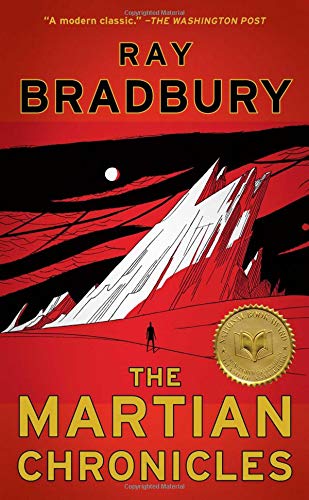Our book group choice for February 2021 is The Martian Chronicles by Ray Bradbury. The Martian Chronicles tells the story of humanity’s repeated attempts to colonize the red planet. The first men were few.
The Martian Chronicles is a science fiction novel by Ray Bradbury, published in 1950. It is a collection of 26 loosely connected short stories and novellas that tell the story of humanity’s first contact with Mars and the subsequent colonization of the planet.
The novel begins in the early 20th century, as the first humans begin to arrive on Mars. The Martians are a peaceful and gentle people, but they are quickly overwhelmed by the technological superiority of the humans. The humans begin to build cities and factories on Mars, and they soon transform the planet into a mirror image of Earth.
As the human population on Mars grows, so does the tension between the humans and the Martians. The Martians begin to resent the humans’ destruction of their planet, and they eventually launch a series of attacks against the human settlements. The humans retaliate, and a bloody war ensues.
In the end, the humans are victorious, but the Martians are all but wiped out. The humans then begin to rebuild Mars in their own image, creating a new world that is both a paradise and a prison.
The Martian Chronicles is a complex and multilayered novel that explores a wide range of themes, including the nature of humanity, the dangers of colonialism, and the possibility of nuclear war. Bradbury’s writing is lyrical and evocative, and he creates a vivid portrait of a Mars that is both familiar and strange.
The novel is divided into three parts: “The Long Years,” “The Martian Chronicles,” and “The Million-Year Morning.”
- The Long Years tells the story of the first human explorers on Mars. The stories in this section are mostly set in the early 20th century, and they explore the themes of loneliness, isolation, and the fear of the unknown.
- The Martian Chronicles tells the story of the human colonization of Mars. The stories in this section are mostly set in the mid-20th century, and they explore the themes of conflict, violence, and the destruction of the natural world.
- The Million-Year Morning tells the story of the future of Mars. The stories in this section are mostly set in the 21st century, and they explore the themes of hope, rebirth, and the possibility of a new beginning.
Discussion Questions for The Martian Chronicles
- Did you enjoy the book? What was your attitude towards reading science fiction coming into the novel?
- Why did Bradbury open the narrative with Ylla? How did it compare to your preconceptions of the genre?
- What did you feel while reading Chapter 3: The Summer Night? What was happening?
- What did you make of the fate of the men in the 2nd Human Expedition? The Earth Men
- By the third expedition, whose side were you on? What did you make of the fate of that crew? And of the Martians?
- The fourth expedition has a different feel, what did you think about Spender’s conversion?
- Night Meeting features two Mars residents who cannot see the destination of the other. What is Bradbury saying through these characters? Who is the real ghost: Tomas or the Martian?
- Way in the Middle of the Air considers racial dimensions, what messages was it sending? Was it successful?
- Usher II is stylistically different from the rest. What is it saying and which historical parallels are being drawing upon?
- The Martian is perhaps the most science fiction of the stories. What is being said about parenthood?
- How did The Luggage Store and The Off Season change the mood of the book? Is what Father Peregrine says true: that we don’t believe in things that happen far away?
- What is Bradbury saying about romantic relationships in The Silent Towns? Is this merely a sexist product of the Male Gaze? Or is Bradbury making a different point?
- What is the effect of the final story, The Million-Year Picnic? How does it fit in with the rest?
Broader Questions
- Why Mars?
- What is Bradbury saying about the nature of frontiers and the pioneers who occupy them? Is this affected by the perspective from which the stories are told?
- Both Mars and Earth experience the apocalypse with chicken pox and nuclear war. What was Bradbury trying to imply?
- Naming and the importance of identity is a recurring theme. What is Bradbury suggesting?
- Would there have been a nuclear holocaust if there wasn’t a colony on Mars?
- In the context of global warming, would you be tempted to migrate to an off-world colony?
- What’s the point of it all? Why did Bradbury write this book?
- Did the book leave you more optimistic or pessimistic about the future?
- Did The Martian Chronicles change your perception of Science Fiction?
- Did you have a favourite vignette?
- To whom would you recommend the book?
Individual Ratings
Catherine's Rating 




Anthony's Rating 




Willow's Rating 




Sue's Rating 




Baljit's Rating 




DKB's Rating 





